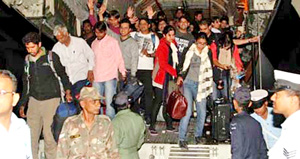New Delhi, April 28: Nearly 5,400 Indians have been brought back from quake-hit Nepal as India continued its relief and rescue efforts in the Himalayan country which is reeling under impact of a massive earthquake.
Foreign Secretary S. Jaishankar said that 5,400 Indians had been brought back by various means including civil and military planes and by road.
He said that a team of officials was in Nepal to help restore power in the wake of the earthquake. Another team from Indian Oil Corporation was also there.
Jaishankar said opening of roads will help faster movement of relief materials as there were logistical constraints concerning flights due to pressure on the airport in Kathmandu.
"Our hope is that from tomorrow onwards, there is greater share of road movement." he said.
Saturday's earthquake, measuring 7.9 on the Richter scale, and its aftershocks in Nepal have left over 3,800 people dead and 6,500 injured.
Jaishankar said priority was being given to the aged, the injured and women and children in efforts to bring the Indian citizens back from the Himalayan country.
He said India had also brought out about 30 foreign nationals from Nepal and had requests from various countries.
Officials said India has so far sent 22 tons of food packets and dry rations, 50 tonnes of mineral water, two tonnes of medicines, 40 tents and 1,400 blankets.
Several medical teams have been sent to Nepal.
Officials said that Indian Army has opened a road from Kathmandu to Pokhra and satellite communication link has been established between the Nepal Army headquarters and Indian Army engineer task force, which was inducted on Sunday.
The army's expedition team at Everest Base camp is assisting in evacuation and rendering medical aid. Helicopters were being used to evacuate people and 203 civilians had been evacuated to safe areas by joint efforts of National Disaster Response Force and Indian Air Force.
The IAF pressed four C-17 Globemaster III, three C-130J Super Hercules, three IL-76 and two AN-32 aircraft in rescue and relief efforts on Monday.
Officials said that some state governments are also contributing to relief efforts in Nepal. They said ten buses sent by Bihar government have already reached Pokhra nd are engaged in evacuation.
Delhi's Tihar Jail Authority have sent 1,500 kg biscuits and 500 kg `namkeen' for the earthquake victims.





Comments
Add new comment